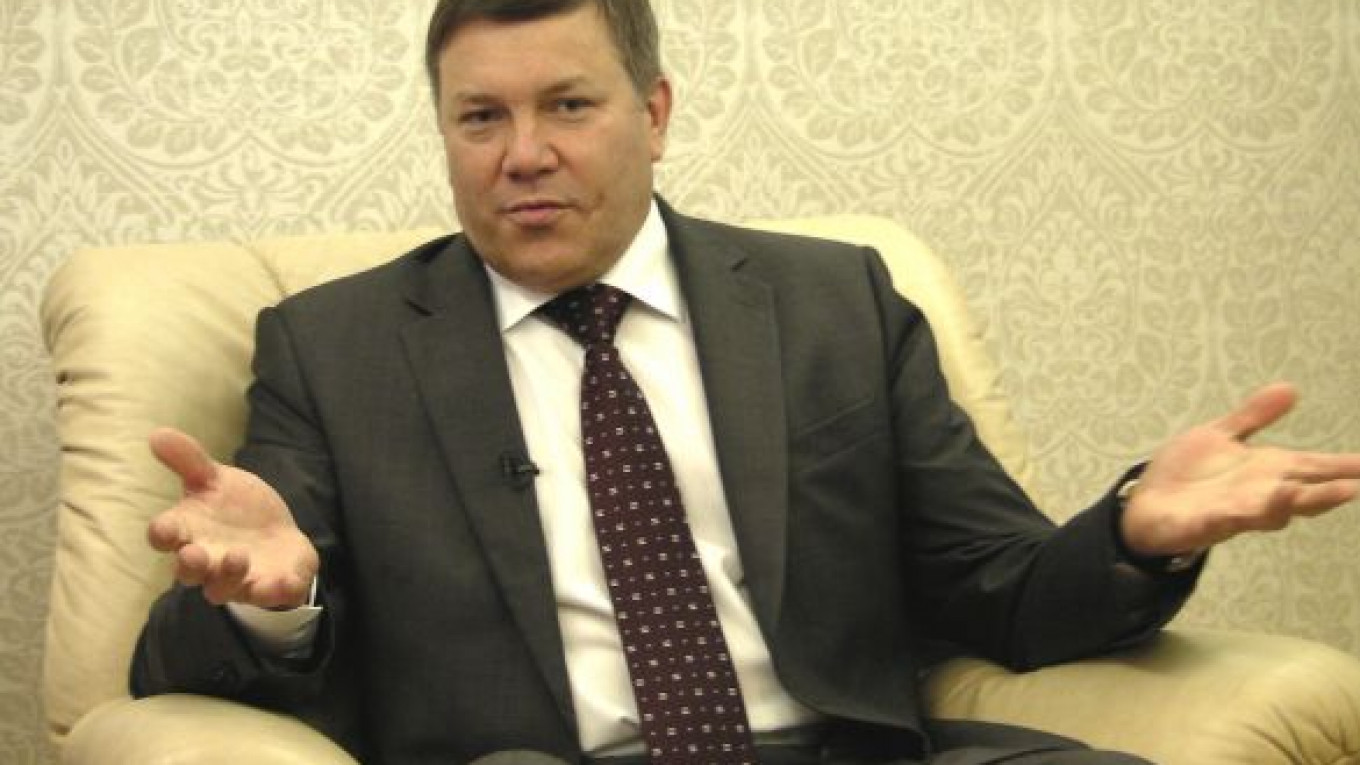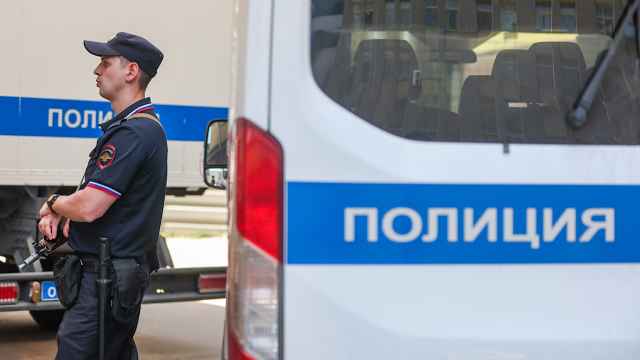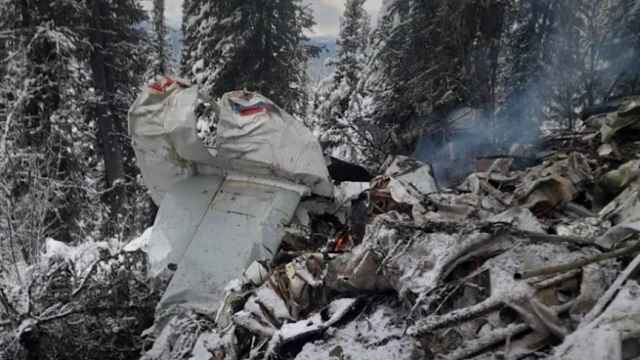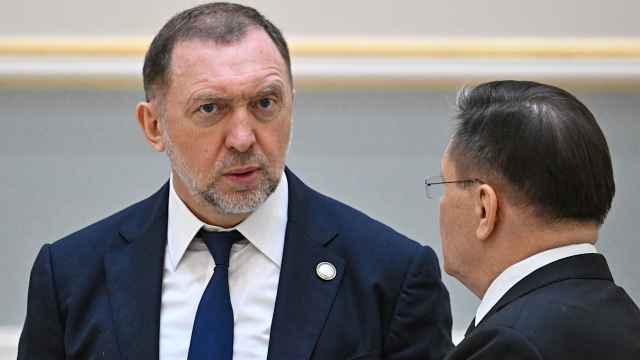Oleg Kuvshinnikov knows how to send the hockey puck towards the goal, and uses the same energy and drive to try to make the region he governs a winner.
He played ice hockey in his youth, knows the taste of victory, and likes it. “I take great pleasure in seeing the results of my work. I am inspired by results,” he said. Having worked his way up over a 15-year career from a repairman to a senior manager at the Cherepovets Metallurgical Plant 490 kilometers from Moscow, Kuvshinnikov’s go-getter attitude, determination and leadership skills propelled him beyond the factory’s walls into the mayor’s chair of the factory town in 2007.
Oleg Kuvshinnikov
1991 — Yaroslavl Technical School
1994 — St. Petersburg Institute of Trade and Economics
1999 — Moscow State University of Management
2005 — MBA from Academy of National Economy
Work experience
2011-present — Governor of Vologda Region
2007-2011 — Mayor of Cherepovets City
2004-2005 — Member of Severstal Board of Directors
2002-2006 — Deputy of Cherepovets City Duma
1987-2002 — Cherepovets Metallurgical Plant, various positions
Favorite book: The works of Theodore Dreiser, who helped my development as an economist. I also like books by Jerome Jerome and Agatha Christie.
Reading now: Novels by Edward Topol.
Movie pick: The Soviet-era classic, Love and Doves (1984), directed by Vladimir Menshov; Commando (1985), directed by Mark Lester.
Favorite Moscow restaurant: Genatsvale on Stary Arbat.
Weekend getaway destination: Igora Ski Resort near St. Petersburg.
His drive and results gained the attention of then-President Dmitry Medvedev, who appointed Kuvshinnikov governor of the Vologda region in December 2011.
He started off with a bang, replacing the former bureaucratic, resource heavy and unresponsive regional administration with a team of young, energetic professionals, capable of making spot decisions and taking responsibility for their actions.
Compared to the city where he flourished as a metals executive, Vologda seemed very slow to him. Even the snow there falls slower than in Cherepovets, Kuvshinnikov was quoted as saying. But he was determined to change that.
In the first few months in office, the new governor jump-started the governmental machine, set clear socioeconomic goals and made municipal heads accountable for the decisions they made and projects they oversaw.
“We optimized the governor’s cabinet, reduced the number of vice-governors from 18 to 7 and the number of departments from 53 to 23. We also reduced the number of staff by one- third. This removed a lot of bureaucratic barriers that stood in the way of economic development [of the region],” Kuvshinnikov, 48 said in an interview with The Moscow Times, in which he bubbled with enthusiasm, as if he had just won five games in a row and was heading for the finals.
The governor uses the skills he learned as an ice hockey captain to lead his team. Their moves are highly visible and the voters are given a chance, like fans, to cheer or boo bureaucrats through various online feedback channels. Officials who garner the most criticism are replaced. “The people decide,” Kuvshinnikov said.
His mission statement was the achievement of “a new quality of life through a new quality of government and a new quality of economy.”
“Life must be comfortable, safe and self-sufficient. The economy must be predictable and growing. Government must be open, transparent, accessible and effective,” the governor said.
It is easy to guess that the Kuvshinnikov-driven restructuring attracted waves of praise and criticism at the same time. It was a calculated risk, he said. He hoped to receive support from citizens when they start seeing results of his work.
Medvedev has since expressed his trepidation at Kuvshinnikov’s approach. “You are a young governor,” Medvedev said during a meeting last October. “You took office rather recently. You should work to retain all of the positive things that have been achieved in the past years.” The prime minister then conceded, however, “you are a man with experience.”
Riding on the back of the metallurgical plant that is now part of Severstal, the regions was hit hard by the 2008 global financial crisis. It is the only region in Russia whose economy has not yet returned to its pre-crisis state, the governor said.
His administration launched development programs in tourism and agriculture to help the local economy and started the Vologda Region Development Corporation to attract investments.
Vologda has its share of known brands, including a nationally popular butter and the legendary town of Veliky Ustyug, the birthplace of Ded Moroz — Russia’s Father Christmas — which has been revived as a sporting and tourist focal point. The region started producing ecologically clean and preservative free food products, including wild berries and caviar.

The region's eponymous capital Vologda was, like Moscow, founded 860 years ago, and is nicknamed "the holy land," with more than 100 residents having been canonized as saints. (wikipedia.org)
This interview has been edited for length and clarity.
Q: Which of your career experiences have been most useful in your role as governor?
A: The most useful experience comes from my work back at the Cherepovets Metallurgical Plant. We had a strict work regime and clearly defined goals. All effort went towards achieving those goals. It is the ability to mobilize a team to achieve goals that really helped me when I first become the mayor of Cherepovets and now the governor.
Q: What is your secret to successful management?
A: When I was in charge of a rolling shop at Severstal, a need arose for a new manager in the sheet-rolling mill in order to improve production output. I knew how hard it was to achieve those targets. But nevertheless, I put my hand up. As a result, we achieved a lot and made that section the best-performing part of the entire plant.
To accomplish this, I changed the operational model, set clear and achievable goals, then mobilized and motivated the team to achieve the new targets.
This success made me realize that you don’t have to be a specialist in a particular field in order to introduce innovative technologies. You have to understand the concept of how to build a team and how to build a production process.
It made me believe that I have the potential to apply the same management approach in different settings, to turn a hopeless enterprise into a leader.
Q: What goals have you achieved as governor, and what proved to be more difficult than you thought?
A: The main goal was to balance the budget. We had to engage in intensive optimization and belt tightening — not only the government, but also the population.
This, of course, was a difficult task with a degree of political and social risks. If the community didn’t accept my program, no will vote for me.
Through much effort I was able to balance the budget and win support of all social and political groups, financial trade groups, community organizations and the local parliament deputies. They realized that the program would take our region out of the dead end we were in.
Q: What advice would you offer a foreigner who wants to invest in the Vologda region?
A: The Russian market is very different from that of Europe or North America. There, it is difficult for new participants to enter. It’s already formed and distributed between big players.
In Russia, economic potential is much greater than in any other country in Europe or America. The consumer potential is huge. As people’s income grows, product consumption will grow too. It will happen. The market is enormous.
This is true for building materials, food, metallurgy and other products. It is an unlimited market that will grow.
Q: Where should a potential investor in your region start?
A: With the Vologda Region Development Corporation that I established. It is the first point of contact for investors. They will be looked after there. Office space, professional help and so forth is all at hand. We can also attach a support person to the project, reporting directly to me.
Q: How many investors are there in your region now?
A. There is a number of companies that have operations in the region. These include Nestle, Ikea, Metsaliitto, Thales and others. They invest, buy and serve other projects.
Q: How do you deal with corruption?
A. You know, of course, it would be a lie if I said that there was no corruption. I can only speak for our region. Every corruption incident that I discover immediately gets referred to the corrective authorities and the Investigative Committee. It happens no matter who is involved.
If an investor is concerned about corruption, I tell them that they can invest under the governor’s guarantee. It means that if anybody anywhere demands money from them, a kickback or anything like that, they can pick up the phone and report it directly to me, in real time. I can assure you that that individual will never work with us again and will be removed from the project completely.
Corruption exists because the punishment doesn’t match the crime. Punishment for corruption needs to include compulsory property confiscation. Until it happens, corruption will exist.
Q: Who inspires you?
A: I take pleasure in my work. I am inspired by results. I am a workaholic, I like what I do.
As for people, my father inspired me; he is also a hard worker. In different stages in life, I was inspired by my line managers and people who saw potential in me. Alexei Mordashov from Severstal was one of them.
Q: What is the best way that the populace can improve its political consciousness?
A: The civilian population has woken up, and they must be informed to the maximum. I am present in all social networks. We don’t have censorship. I am comfortable with criticism they throw at me or my team. I am for honest work and maximum transparency. I am for dialog with other political parties.
Q: What keeps you up at night?
A: Nothing! I sleep like a dead man! I drag myself to the pillow at midnight, and am up and running again at 6 in the morning.
Q: What would you say to the young people who look at you as a role model?
A: This saying describes it best: “Not everyone walking will reach the destination; only the one who walks without feeling sorry for himself will.”
Contact the author at [email protected]
A Message from The Moscow Times:
Dear readers,
We are facing unprecedented challenges. Russia's Prosecutor General's Office has designated The Moscow Times as an "undesirable" organization, criminalizing our work and putting our staff at risk of prosecution. This follows our earlier unjust labeling as a "foreign agent."
These actions are direct attempts to silence independent journalism in Russia. The authorities claim our work "discredits the decisions of the Russian leadership." We see things differently: we strive to provide accurate, unbiased reporting on Russia.
We, the journalists of The Moscow Times, refuse to be silenced. But to continue our work, we need your help.
Your support, no matter how small, makes a world of difference. If you can, please support us monthly starting from just $2. It's quick to set up, and every contribution makes a significant impact.
By supporting The Moscow Times, you're defending open, independent journalism in the face of repression. Thank you for standing with us.
Remind me later.






